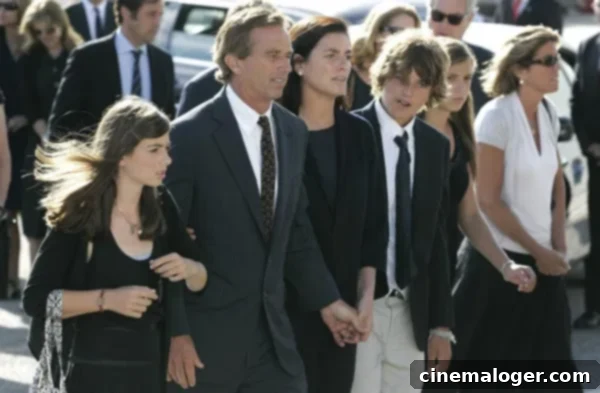The Tragic Loss of Mary Kennedy: Unraveling Grief, Divorce, and the Kennedy Family Legacy
The profound sorrow surrounding the death of Mary Kennedy, the estranged wife of prominent environmental advocate Robert F. Kennedy Jr., sent shockwaves through the public sphere. Her passing not only marked a personal tragedy but also reignited discussions about the complexities of marriage, separation, mental health, and the immense pressure faced by individuals connected to iconic public figures. While the question of fidelity remains a point of speculation, it is undeniably clear that Mary struggled profoundly with the swift progression of her husband’s new life, leaving behind a devastating legacy of grief for her four children.
The speed with which Robert F. Kennedy Jr. moved on to a public relationship with Hollywood actress Cheryl Hines became a central point of contention and public scrutiny. Was such a rapid transition, including a significant geographical relocation, truly necessary or considerate given Mary’s known vulnerabilities? For many, the perception was that a man who had shared 18 years of marriage and four children with Mary might have owed her a greater degree of care and consideration, especially in light of her well-documented history of struggles with substance and alcohol abuse.
A Life Interrupted: Mary Kennedy’s Battle with Depression and Isolation
Mary Kennedy’s journey was marked by significant challenges, both personal and public. Her marriage to Robert F. Kennedy Jr. placed her within the orbit of one of America’s most famous and scrutinized families, a role that often comes with unique pressures and expectations. While Robert F. Kennedy Jr. was building a distinguished career as an environmental lawyer and activist, earning accolades for his work to protect vital natural resources like the Hudson River, Mary was reportedly battling her own private demons. His public efforts, which drew support from celebrities such as Harrison Ford, Lorraine Bracco, and John McEnroe, painted a picture of a man deeply committed to causes, leading many to question if the same dedication was applied to his struggling marriage.
The unraveling of their relationship became increasingly public in the years leading up to her death. In 2010, Mary faced legal troubles, losing her driving license after being charged with a DUI. Shortly thereafter, on May 12, 2010, Robert, then 58, filed for divorce. This legal step followed an incident just two days prior where Mary reportedly called the police to complain about her husband, only to appear “visibly intoxicated” upon their arrival, according to police reports cited by the New York Post. These events painted a stark picture of a marriage in severe crisis, with Mary increasingly isolated and vulnerable.
Sources close to the family and neighbors consistently described Mary as a “devastated soul” as her marriage disintegrated. According to the NY Daily News, she felt “lonely” and “lost.” A close family friend revealed to the New York Post that Mary harbored feelings of being “used up and tossed away” by Robert. These raw sentiments underscore the profound emotional toll the separation was taking on her, suggesting a deep sense of abandonment and despair.
The Allegations of Affairs and Financial Strain
Beyond the emotional void, there were also swirling allegations of infidelity and financial anxieties that further compounded Mary’s distress. Anonymous sources, quoted by the New York Post, claimed that Mary was “expected to toe the line, stay quiet and take care of the kids, tolerate the affairs, and look happy,” adding that “the alleged affairs took a terrible toll.” While the veracity of these claims remains contested by some, the perception alone would have been incredibly damaging to her emotional well-being, eroding trust and exacerbating feelings of worthlessness.
Compounding these emotional burdens, Mary reportedly faced significant financial worries. Radaronline reported that she feared losing her home, a fear that would naturally intensify the feeling of instability and precarity in an already tumultuous period of her life. The combination of alleged emotional neglect, public humiliation, and financial insecurity would undeniably create an overwhelming environment for anyone, let alone someone with a history of depression and substance abuse.
The Irreversible Impact on Children and Lingering Questions
The ultimate tragedy of Mary Kennedy’s suicide by hanging left an indelible mark, particularly on her four children. At the time of her death, her two older children were away at school, and her two younger children were reportedly with their father. This fact only adds to the poignant circumstances of her passing, leaving one to imagine the profound solitude she must have felt in her final moments. After years of devotedly raising her children and fulfilling the role of a wife, the reported feelings of being “unneeded and unloved” would have been unbearable.
The aftermath of such a loss for children is complex and enduring. They are left motherless, grappling not only with immense grief but often with an unwarranted sense of guilt, believing, however irrationally, that they might somehow bear responsibility. This burden can haunt them for a lifetime, making Mary’s death a needless tragedy that will shape their lives forever.
The circumstances surrounding Mary’s final years inevitably prompt difficult questions directed at Robert F. Kennedy Jr. Could he have offered more attentive support? Was it possible to ensure she received the critical help she desperately needed for her mental health? Could he have alleviated her very real financial concerns, thereby removing one significant stressor during her darkest hours? Many observers ponder whether the timing and nature of his new relationship were truly unavoidable, or if more sensitivity could have been exercised to prevent further distress to an already fragile soul.
While the full extent of personal responsibility in such complex situations is often nuanced and debated, one aspect remains unequivocally clear: the future well-being of the children. Regardless of what could or could not have been done to prevent Mary’s suicide, Robert F. Kennedy Jr. now faces the monumental task of providing unwavering support and guidance to his children as they navigate the profound and lasting grief of losing their mother. Helping them cope with this terrible loss becomes his most critical responsibility, a task that demands every ounce of his attention and love.
The story of Mary Kennedy serves as a stark reminder of the hidden battles many face, the critical importance of mental health support, and the far-reaching consequences of personal decisions within the public eye. Her tragic end underscores the need for compassion, understanding, and sustained support for those struggling, highlighting that even within the most prominent families, profound personal struggles can lead to devastating outcomes.
About the Author
Bonnie Fuller

Email me!| Follow Hollywoodlife.com on | Become afan
More on Mary Kennedy:
- Mary Kennedy’s Death A Suicide: Hanged Herself In A Barn — Pics
- Mary Kennedy In ‘Very Dark Place’ Before Death — PICS
- Mary Kennedy Found Dead In NYC At 52 — Pics
